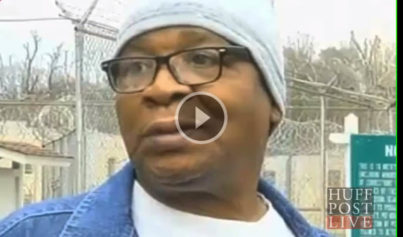[playwirevid id=’3539865′]
By Manny Otiko
For Glenn Ford freedom came too late. Ford, who was freed last year after 30 years on death row, died Monday. He enjoyed a little over a year of freedom before succumbing to lung cancer that first showed up while he was imprisoned in the notorious Louisiana State Penitentiary at Angola.
Ford’s case is all too familiar. He was a poor Black man convicted by an all-white jury of the murder of Isadore Rozeman, a Shreveport jeweler. He had a largely incompetent defense and faced a prosecutor, A.M. “Marty” Stroud III, who was eager to get a murder conviction. He was sentenced to death and spent most of his time in solitary confinement. Ford maintained his innocence and in March 2014, he was released after Caddo Parish prosecutors found credible evidence clearing him of the crime.
What’s unusual is Stroud later sought Ford out and apologized for his actions. In a column in The Shreveport Times, he admitted that back in 1984, he had been an arrogant, young prosecutor more interested in winning cases than justice. After the case, which sentenced Ford to death, he went out and celebrated with drinks.
However, years after the case, Stroud came to realize the error of his decision and the unfairness of the death penalty.
“The clear reality is that the death penalty is an anathema to any society that purports to call itself civilized,” Stroud said. “It is an abomination that continues to scar the fibers of this society and it will continue to do so until this barbaric penalty is outlawed.”
If Stroud was looking for absolution for his crimes, he didn’t get it from Ford, who endured a difficult life on the outside after suffering torturous conditions in prison. Ford was released and given only $20 in bus fare. The Times-Picayune reported he tried to sue the state of Louisiana for wrongful imprisonment, but his case was denied after Louisiana Attorney General Buddy Caldwell filed a petition stating Ford was not “factually innocent.” First Judicial District Court Judge Katherine Clark Dorroh also sided with Caldwell and stated Ford shared some responsibility for Roseman’s death because he knew of the crime and tried to sell a weapon used in the murder.
According to ABC News, Ford could have been eligible for up to $330,000 in restitution, which would have made the last months of his life comfortable. He was surviving on donations and being cared for by a team of volunteers. At the time of his death, Ford was involved with a federal lawsuit over the poor medical care he received in prison, which failed to treat his cancer.
In a meeting arranged by ABC’s Nightline, Ford said he had suffered too much to forgive Stroud for his mistake.
“I’m sorry. I can’t forgive you,” he told Stroud.
Apart from campaigning against the death penalty, Stroud also became a strong supporter of the state compensating Ford for his lost years in prison.
“Glenn Ford deserves every penny owed to him under the compensation statute,” Stroud said. “This case is another example of the arbitrariness of the death penalty. I now realize, all too painfully, that as a young 33-year-old prosecutor, I was not capable of making a decision that could have led to the killing of another human being.”
Ford knew he didn’t have much time left and tried to make the most of his newly-found freedom. He went to Disneyland, JazzFest in New Orleans and on a cruise with his family. The trips were funded by donations to a GoFundMe account established by a Massachusetts woman, who had been moved by his story, according to The Advocate.
“I find that amazing,” Ford said. “That’s the only bright part of the whole 30 years, the outpouring of people.”

